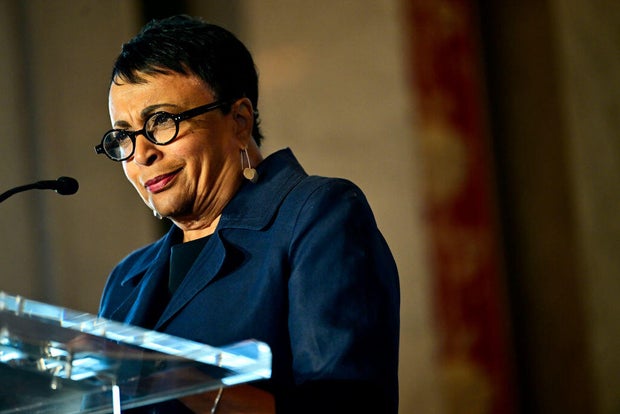The recent dismissal of Dr. Carla Hayden as the Librarian of Congress has sparked a flood of controversy across political and academic communities nationwide. Dr. Hayden, an iconic figure in the realm of library sciences and the first woman and African American to hold the prestigious position, was unceremoniously removed from her role, according to a congressional source who spoke with CBS News.
The termination was communicated through an email sent by Trent Morse, the deputy director of presidential personnel, which stated: “On behalf of President Donald J. Trump, I am writing to inform you that your position as the Librarian of Congress is terminated effective immediately. Thank you for your service.” This stark dismissal has sent ripples through the corridors of power in Washington, D.C., particularly given Dr. Hayden’s esteemed record and broad popularity.
This move by the Trump administration has been met with severe backlash from various quarters, including prominent Democratic leaders who have not only condemned the manner of dismissal but also questioned the motivations behind it. House Minority Leader Hakeem Jeffries lambasted the administration, stating, “the unjust decision to fire Dr. Hayden in an email sent by a random political hack is a disgrace and the latest in his ongoing effort to ban books, whitewash American history and turn back the clock.”
Dr. Hayden took on the role of Librarian of Congress in 2016, bringing a fresh perspective and a dynamic approach to the institution. Prior to this, she had had a storied career including a transformative tenure as the CEO of the Enoch Pratt Free Library in Baltimore, Maryland, from 1993 until 2016, and roles at the Chicago Public Library. Her educational background is just as impressive, with degrees from Roosevelt University and the University of Chicago.
The impact of Dr. Hayden’s work is particularly profound when considering her own reflections on her historical appointment. In a 2020 interview with CBS News, she remarked, “Personally, being a person of color, it means so much because people who look like me were forbidden by law to learn to read… That means so much that here is a person of color leading the world’s largest library.”
With the abrupt end to Dr. Hayden’s tenure, Robert Newlen, the principal deputy librarian who is a veteran of the Library of Congress, has been named as the acting librarian until further notice from the White House.
The timing and nature of this firing have spurred further criticisms regarding its broader implications on the freedom of information and cultural history. Democratic Senate Minority Leader Chuck Schumer has proposed changes to how the position is filled, arguing for a shift to appointments by a congressional commission rather than directly by the President. Such a move, according to Schumer, would prevent such positions from being treated like “reality TV prizes.”
Joining the fray, Democratic Rep. Joe Morelle, the ranking member on the Committee on House Administration, described the firing as an “ignorant decision” emphasizing that it could negatively affect America’s libraries, their economic interests linked to copyrights, and diminish the service quality to the American public and Congress.
In light of these developments, CBS News reached out to the White House for a comment on this contentious firing and confirmed the details of the dismissal through a Library of Congress official. The news outlet, endeavoring to cover this significant change extensively, included contributions from veteran reporters such as Weijia Jiang and Scott MacFarlane, both of whom have substantial experience and accolades in journalism covering significant political and justice-related matters.
The termination of Dr. Hayden highlights a notable intersection of politics and information governance, raising critical questions about the safeguarding of intellectual freedom and the management of some of the nation’s most critical cultural and educational resources. As reactions continue to pour in and discussions ensue among political, academic, and public circles, the full ramifications of this decision await to be seen, potentially reshaping the landscape of American cultural stewardship and political discourse surrounding federal appointments.









